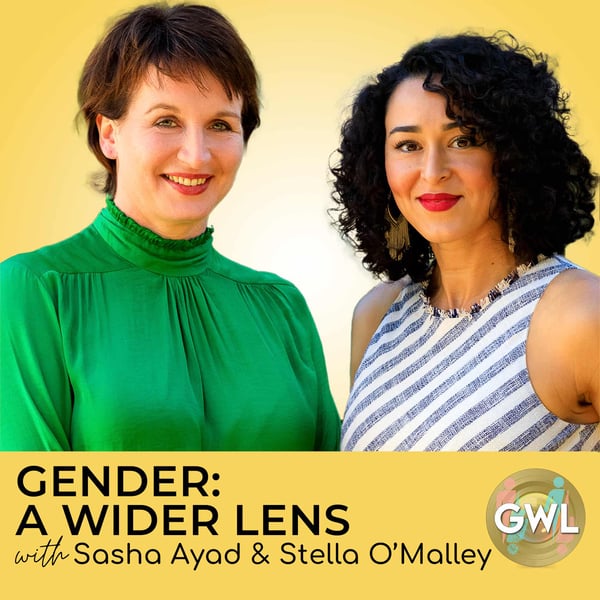Premium: How "Trans" Has Changed Over the Years
Gender: A Wider Lens
Sasha Ayad and Stella O'Malley
4.6 • 961 Ratings
🗓️ 25 January 2025
⏱️ 4 minutes
🧾️ Download transcript
Summary
As societal perceptions of gender identity continue to evolve, the conversation around gender dysphoria has grown increasingly complex and polarized, particularly in recent years. This has sparked critical questions about the underlying causes of gender identity confusion, the role of medical interventions, and the broader cultural implications. Exploring these topics requires a careful balance of scientific inquiry, ethical considerations, and an openness to the diverse experiences of those affected.
As public discourse has become more contentious, the space for nuanced discussions about the complexities of transgender identities has narrowed. This polarization often reduces the conversation to simplistic binaries of affirmation versus denial, leaving little room to explore the diverse experiences and motivations that shape individuals’ journeys.
The concept of being "trans" has undergone a significant transformation. Today, the term encompasses a wider array of experiences than those represented in the “T” category of the LGBT culture of yesteryear. Nonbinary identities, the rainbow alphabet, and the many expressions of gender that do not involve dysphoria are being amplified by the influence of the algorithm, potentially influencing individuals to adopt identities that may not reflect deeper, intrinsic realities.
The increase in minors identifying as transgender has brought these dynamics into sharper focus. A significant rise in the number of young people, particularly adolescent girls, identifying as trans has prompted questions about the underlying causes. Trauma, social pressures, and identity exploration have all been suggested as factors contributing to the “trans” trend. And while the broadened definition of “trans” has fostered a growing societal acceptance of diverse gender expressions, some argue that this fluidity has diluted the term itself, making it harder to discern the underlying motivations or needs of those who identify as transgender.
In this bonus episode for premium subscribers, Jessi critiques the political and social trends influencing youth, particularly the notion that being transgender is seen as "cool" or "edgy." She emphasizes the irreversible consequences of transitioning, particularly for those under 25, whom she believes lack the maturity to make such significant decisions. She also highlights how societal stereotypes about gender roles impact both men and women. She points out that rigid expectations, such as "big boys don't cry," contribute to gender identity struggles and may lead some young men to identify as transgender as a way to escape these pressures.
Watch our full length episode with Jessi: https://www.widerlenspod.com/p/episode-202
For instructions on setting up a private feed to listen to our premium content in your favorite podcast app, visit https://www.widerlenspod.com/p/how-to-listen-to-our-full-premium.
Transcript
Click on a timestamp to play from that location
| 0:00.0 | Hi, widerlens podcast listener. What you're about to hear is a preview of one of our bonus episodes for premium subscribers. |
| 0:08.0 | If you'd like to hear the rest, head over to widerlenspod.com and sign up for any of our paid membership options. |
| 0:15.0 | Paid subscriptions allow us to continue to create high quality content for our listeners all around the world. |
| 0:20.0 | Now here's the preview of this week's exclusive content. |
| 0:24.6 | My perspective on the kids these days, I don't believe that any young person, up until, and I believe I've heard this more than once, up until about 25, I don't believe anybody should do this. |
| 0:47.3 | I know that there's a couple of us out here, Buck and Blair and Marcus, that all transitioned as adults. |
| 0:59.0 | And even they had to go through a process. |
| 1:04.3 | And kids don't understand it. |
| 1:09.0 | They don't, I mean, they just don't understand the fact that you know what |
| 1:13.2 | this has irreversible cause and effect you know it's not about just green hair and piercings and |
| 1:22.1 | i'm a trans person there were younger people that I saw in my job. |
| 1:30.9 | I worked in a community health clinic in Seattle and I was, I worked in the lab. |
| 1:35.5 | I was a phlebotomist and there was a trans care team at that clinic. |
| 1:43.6 | Most of the trans kids, and I say kids because I'm 69, most of the young people that |
| 1:49.2 | came through there showed absolutely no stereotypical behaviors like calling themselves trans man |
| 1:59.0 | and coming in in a pink tutu. |
| 2:02.6 | Okay? Calling themselves a trans woman, and yet they come in in a beard. |
| 2:07.6 | That to me, I, that's not, that's just not. |
| 2:14.6 | And as a matter of fact, for an example, I had one person come in who was female to male or attempting. |
| 2:26.1 | And part of the conversation these days is about that a lot of there's comorbidities not some |
| 2:38.2 | yeah along with there's autism or there's a need or someone has a mental health issue |
| 2:45.4 | I have a mental health issue after all this trust trust me. But the underlying, there's an underlying |
... |
Please login to see the full transcript.
Disclaimer: The podcast and artwork embedded on this page are from Sasha Ayad and Stella O'Malley, and are the property of its owner and not affiliated with or endorsed by Tapesearch.
Generated transcripts are the property of Sasha Ayad and Stella O'Malley and are distributed freely under the Fair Use doctrine. Transcripts generated by Tapesearch are not guaranteed to be accurate.
Copyright © Tapesearch 2025.

